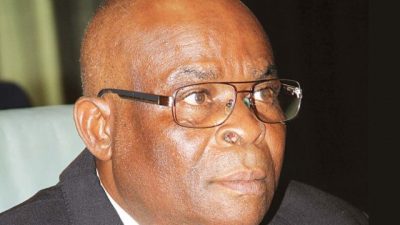Prof. Itse Sagay (SAN), Chairman of the Presidential Advisory Committee Against Corruption (PACAC), in a recent interview speaks on latest developments in the polity.
Excerpts:
What is your perspective on the suspension of the CJN, Walter Onnoghen by President Muhammadu Buhari?
I have been questioned on this matter and I have said the suspension of the former CJN by President Muhammadu Buhari is both morally and legally valid. Morally, it is valid because as head of such a major institution, where you are supposed to show standard of ethics and good conduct, where such an allegation is made against you, even if you have to defend it, you must step down.
You must step down because the charges will be heard in institutions which are headed by you, the CJN. There is no way it is going to be a fair process if you are still sitting there at the top and your underlings are the ones hearing the petitions that have been brought against you. So, it is not just morally right for him to remain there while the case is being heard.
On the legal issue, I have two approaches, which is that a Tribunal which is a court of law has made an order and the government is bound to carry out that order. That is exactly what has happened. The order by the Tribunal is that the CJN should step down immediately.
The moment that order was issued, the CJN ceased to Chief Justice of Nigeria. He became acting because that order did not sack him but step him down from his position, pending the hearing of the case.
So, with that order, the CJN is no longer in a position to exercise his power as Chief Justice pending the hearing of the petition.
For me, what the President did was merely affirming an already existing situation because a court had made a pronouncement on that issue.
My second approach is that if I were the President, having advised the Chief Justice to step down, pending the hearing of the case and he refuses to do so, and I know the very grave implications of him remaining in position while all institutions under him and presiding over his own case, I as President will suspend him.
How is that justified? If you look at Section 292 paragraph 1, there are four points there. It says the Chief Justice can be removed by the President on grounds of unfitness for office, either physical, mental, on grounds of misconduct and finally on grounds that he has broken the Code of Conduct.
The President can remove him if he does all this. Before removing him, he has to send his name to the Senate and if the Senate adopts the proposal of the President by two-thirds of the majority, then the President can finally remove him. Now the question may be asked: why did he suspend him before sending his name to the Senate?
The answer is he has not removed him. He has merely suspended him because there is serious charge against him and he ought not to be in office. He will now send the name to the Senate and it will be deliberated upon. If they confirm the President’s charge, then that is when he stands removed.
If they fail to confirm it, then the CJN is restored to office. That is the second approach which has not been adopted by the president in this case. He is obeying a court order but I am saying if he were to adopt the court order, it will be in that sequence- belief that the CJN has committed a breach of the Code of Conduct, suspension from office, sending his name to the Senate and if confirmed by Senate, removal from office.
If the Code of Conduct Tribunal at the end pronounced that he is not guilty, he goes back automatically to his position as CJN. There is no question about that.





